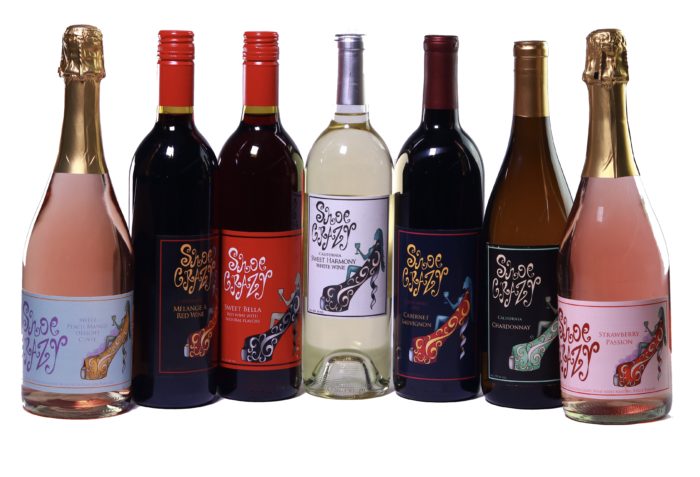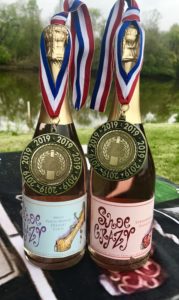Slowed down a bit but undeterred by the pandemic, a Petersburg-based wine company is accelerating its expansion into big retail stores and ramping up its distribution network.
Shoe Crazy Wine, which founder Gwen Hurt runs alongside her three children and a family friend, recently signed deals with Sam’s Club and Food Lion to get bottles in the chains’ Virginia and North Carolina stores. The company is already in 118 Walmart stores in Virginia and North Carolina, and will expand into the retail giant’s Georgia stores in August.
Shoe Crazy Wine also is growing its in-house distribution operations with a factory in Durham, North Carolina, that launched in June, and a presence in Atlanta coming in September.
Hurt said Shoe Crazy Wine was gunning for $2 million in revenue in 2020 before the pandemic, which cut business by 30 to 40 percent and her staff from 15 to five. In-store wine tastings, which are vital to the business’s success, were no longer possible because of health precautions.
“People buy what they taste, and we couldn’t do that anymore,” Hurt said. “There is a lot of competition. There are 2,000 wines out there. I want customers to know there is someone behind a brand that stands behind it, and the part that really makes people stop and take notice is if I say, ‘Hey, I created these wines.’”
Hurt expects sales to rebound to around $1.5 million in 2021, driven by sales in the Mid-Atlantic and a growing distribution channel. She set up a distribution arm in Virginia last year in a 27,000-square-foot warehouse, which Hurt said was an upgrade from her garage.
The company grew sales from $90,000 in 2018 to just under $500,000 in 2019, thanks to a deal it landed with Walmart. Most bottles run from $10-$11, and Hurt said production hit 150,000 bottles in 2020, which she plans to triple by 2021 and triple again in 2022.
Shoe Crazy Wine has grown through local TV commercials, billboards it posted in Richmond, Chesapeake and Northern Virginia, and social media marketing, thanks to Hurt’s daughter Brittny, who gave her the idea to start the company.
Planting the seeds
Nearly all of Hurt’s life savings were on the line when she started Shoe Crazy Wine.
Hurt was injured in a car accident in 2013, shortly after losing her job at Lenovo, where she had worked her way up to head of global process, re-engineering and controls. She spent a year in physical therapy to treat her injuries, and she knew she couldn’t be of much value to a traditional employer at that time.
That led her to start her own business that December by investing $300,000, which Hurt said she got from her buyout, savings, cashing in her 401(k), and selling her designer shoes and clothes. She said she eventually couldn’t pay her electric bill and her house went into foreclosure.
Hurt aimed to raise $1 million from investors but could muster only $150,000. She said she sent out samples to at least 25 small, midsized and large distribution companies, which all passed on Shoe Crazy Wine. Many were skeptical about betting on her.
“We were told by everybody, ‘No, thank you,’” Hurt said, adding she had plenty of wine to sell but no one to distribute it.
Breaking into the highly competitive wine industry as an upstart brand was a monumental task, Hurt said. She knew the industry only as a consumer and didn’t realize how many thousands of brands were jockeying for the same shelf space. She learned it can take two to five years to break in.
Hurt said she was told several times that no one would buy from a wine company owned by a Black woman.
“When you’re a woman, you’re a woman of color, I mean, I’m walking in with two strikes,” Hurt said. “And yet, we have endured because I just go on my mother’s mantra: ‘You are better than what they say you are.’”
Hurt said she held her head high and self-funded by rolling profits back into the business, which she called the “molasses route.”
She partnered with vineyards in California, Washington and Portugal to produce her wines, since she couldn’t afford her own vineyard outright, and aimed to give customers a soft, sweet wine.
Shoe Crazy Wine offers eight varietals: a traditional chardonnay, a cabernet, a red blend, a sweet red, a sweet white, a sparkling peach/mango, a sparkling strawberry and a sparkling brut. The sweet red blend is the top seller, and it’s named Sweet Bella for Hurt’s mother, who died from COVID-19 in April.
Shoe Crazy Wine won its way into Walmart in June 2018 after Hurt heard the retail giant was taking pitches from American brands to add to its stores. She made a 26-hour trek to Walmart’s headquarters in Bentonville, Arkansas, with Daniel Hurt, her sales-minded son, and Edwin Gommers, her CFO, stopping at Walmart stores along the way to study their wine shelves.
The group then rented a house for a month to prepare for the biggest pitch of their lives. Their goal was to know Walmart’s shelves as well as the company’s wine buyers did, and when they finished the 30-minute pitch, their audience had no questions. Shoe Crazy Wine secured the deal that’s been a springboard for success since.
New frontiers
Shoe Crazy Wine will march onto on-base Army exchanges, similar to grocery stores, by 2021, an opportunity four and a half years in the making. Hurt said the Army finally responded during the quarantine, and that’s not the only time a military branch took its time getting back to her.
Hurt said she emailed and called the Coast Guard exchange weekly for years, missing only one week due to the flu. They then reached out to her, asking why she hadn’t sent an email, and that sparked a conversation and a deal, which she said closed in late 2017. Hurt then got her wine into Joint Base Andrews in Maryland and Virginia Navy exchange the next year.
“I didn’t give up. You just have to keep pushing,” Hurt said. “In this industry, you have to be resilient, you have to be tenacious, you have to have thick skin. And you have to be in it for the long haul.”
Hurt said she sees Shoe Crazy Wine growing into a nationally known brand and distribution company, and if her wine sells well in Walmart, Hurt thinks the world’s biggest retailer will ask her what else she has to offer. She’s considering offering seltzers, beer and non-alcoholic drinks, like a strawberry sangria she’s selling online and waiting for FDA approval on before selling it in supermarkets.
Growth through acquisitions is needed for that vision, and Hurt said she’ll look for young companies that have had doors slammed in their faces. Hurt said she knows what brands she’d acquire if she had the money, though she said that’s at least two to three years out.
Hurt said she wakes up some nights, questioning if her foray into other states is the right move. She expects the company to be profitable in 2021, a year after she originally planned, but better late than never.
When that day comes, Hurt said she already knows how she’ll celebrate: with her team, sharing a bottle of sparkling Shoe Crazy Wine.
“That’s going to feel like Christmas and my birthday all rolled into one,” Hurt said.
Slowed down a bit but undeterred by the pandemic, a Petersburg-based wine company is accelerating its expansion into big retail stores and ramping up its distribution network.
Shoe Crazy Wine, which founder Gwen Hurt runs alongside her three children and a family friend, recently signed deals with Sam’s Club and Food Lion to get bottles in the chains’ Virginia and North Carolina stores. The company is already in 118 Walmart stores in Virginia and North Carolina, and will expand into the retail giant’s Georgia stores in August.
Shoe Crazy Wine also is growing its in-house distribution operations with a factory in Durham, North Carolina, that launched in June, and a presence in Atlanta coming in September.
Hurt said Shoe Crazy Wine was gunning for $2 million in revenue in 2020 before the pandemic, which cut business by 30 to 40 percent and her staff from 15 to five. In-store wine tastings, which are vital to the business’s success, were no longer possible because of health precautions.
“People buy what they taste, and we couldn’t do that anymore,” Hurt said. “There is a lot of competition. There are 2,000 wines out there. I want customers to know there is someone behind a brand that stands behind it, and the part that really makes people stop and take notice is if I say, ‘Hey, I created these wines.’”
Hurt expects sales to rebound to around $1.5 million in 2021, driven by sales in the Mid-Atlantic and a growing distribution channel. She set up a distribution arm in Virginia last year in a 27,000-square-foot warehouse, which Hurt said was an upgrade from her garage.
The company grew sales from $90,000 in 2018 to just under $500,000 in 2019, thanks to a deal it landed with Walmart. Most bottles run from $10-$11, and Hurt said production hit 150,000 bottles in 2020, which she plans to triple by 2021 and triple again in 2022.
Shoe Crazy Wine has grown through local TV commercials, billboards it posted in Richmond, Chesapeake and Northern Virginia, and social media marketing, thanks to Hurt’s daughter Brittny, who gave her the idea to start the company.
Planting the seeds
Nearly all of Hurt’s life savings were on the line when she started Shoe Crazy Wine.
Hurt was injured in a car accident in 2013, shortly after losing her job at Lenovo, where she had worked her way up to head of global process, re-engineering and controls. She spent a year in physical therapy to treat her injuries, and she knew she couldn’t be of much value to a traditional employer at that time.
That led her to start her own business that December by investing $300,000, which Hurt said she got from her buyout, savings, cashing in her 401(k), and selling her designer shoes and clothes. She said she eventually couldn’t pay her electric bill and her house went into foreclosure.
Hurt aimed to raise $1 million from investors but could muster only $150,000. She said she sent out samples to at least 25 small, midsized and large distribution companies, which all passed on Shoe Crazy Wine. Many were skeptical about betting on her.
“We were told by everybody, ‘No, thank you,’” Hurt said, adding she had plenty of wine to sell but no one to distribute it.
Breaking into the highly competitive wine industry as an upstart brand was a monumental task, Hurt said. She knew the industry only as a consumer and didn’t realize how many thousands of brands were jockeying for the same shelf space. She learned it can take two to five years to break in.
Hurt said she was told several times that no one would buy from a wine company owned by a Black woman.
“When you’re a woman, you’re a woman of color, I mean, I’m walking in with two strikes,” Hurt said. “And yet, we have endured because I just go on my mother’s mantra: ‘You are better than what they say you are.’”
Hurt said she held her head high and self-funded by rolling profits back into the business, which she called the “molasses route.”
She partnered with vineyards in California, Washington and Portugal to produce her wines, since she couldn’t afford her own vineyard outright, and aimed to give customers a soft, sweet wine.
Shoe Crazy Wine offers eight varietals: a traditional chardonnay, a cabernet, a red blend, a sweet red, a sweet white, a sparkling peach/mango, a sparkling strawberry and a sparkling brut. The sweet red blend is the top seller, and it’s named Sweet Bella for Hurt’s mother, who died from COVID-19 in April.
Shoe Crazy Wine won its way into Walmart in June 2018 after Hurt heard the retail giant was taking pitches from American brands to add to its stores. She made a 26-hour trek to Walmart’s headquarters in Bentonville, Arkansas, with Daniel Hurt, her sales-minded son, and Edwin Gommers, her CFO, stopping at Walmart stores along the way to study their wine shelves.
The group then rented a house for a month to prepare for the biggest pitch of their lives. Their goal was to know Walmart’s shelves as well as the company’s wine buyers did, and when they finished the 30-minute pitch, their audience had no questions. Shoe Crazy Wine secured the deal that’s been a springboard for success since.
New frontiers
Shoe Crazy Wine will march onto on-base Army exchanges, similar to grocery stores, by 2021, an opportunity four and a half years in the making. Hurt said the Army finally responded during the quarantine, and that’s not the only time a military branch took its time getting back to her.
Hurt said she emailed and called the Coast Guard exchange weekly for years, missing only one week due to the flu. They then reached out to her, asking why she hadn’t sent an email, and that sparked a conversation and a deal, which she said closed in late 2017. Hurt then got her wine into Joint Base Andrews in Maryland and Virginia Navy exchange the next year.
“I didn’t give up. You just have to keep pushing,” Hurt said. “In this industry, you have to be resilient, you have to be tenacious, you have to have thick skin. And you have to be in it for the long haul.”
Hurt said she sees Shoe Crazy Wine growing into a nationally known brand and distribution company, and if her wine sells well in Walmart, Hurt thinks the world’s biggest retailer will ask her what else she has to offer. She’s considering offering seltzers, beer and non-alcoholic drinks, like a strawberry sangria she’s selling online and waiting for FDA approval on before selling it in supermarkets.
Growth through acquisitions is needed for that vision, and Hurt said she’ll look for young companies that have had doors slammed in their faces. Hurt said she knows what brands she’d acquire if she had the money, though she said that’s at least two to three years out.
Hurt said she wakes up some nights, questioning if her foray into other states is the right move. She expects the company to be profitable in 2021, a year after she originally planned, but better late than never.
When that day comes, Hurt said she already knows how she’ll celebrate: with her team, sharing a bottle of sparkling Shoe Crazy Wine.
“That’s going to feel like Christmas and my birthday all rolled into one,” Hurt said.






What an inspirational success story! Not “over night” success, but her determination & support from family is inspiring! Congratulations & good luck !
Not only a wonderful example of initiative, intelligence and character; but, also very well written. Virginia quality at its best, all around.
I love everything about this story. Go Gwen!
I met Gwen at a networking event and had an opportunity to taste a couple of her wines. They are delicious and she is a tenacious entrepreneur. I’m glad she’s getting greater distribution and can’t wait to see them on more store shelves.